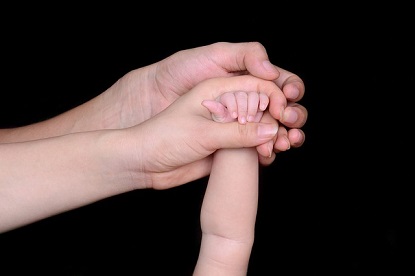It’s come with some challenges, but for Deena Morgan and her husband there was never any real decision to make when it came to deciding to be parents.
Deena was born with glaucoma and as a result now lives with severe low vision, while her husband is also blind. Together, the couple have a 22-month old daughter and while there were some early trepidations, Deena said the decision to have their first child was ultimately an easy one.
“It was something we spoke about. With my husband being blind it was definitely something that we had to think about, but ultimately our desire to be parents outweighed anything else,” Deena said.
“In the end we just thought about our lives. We both work and live independently and we’ve got a lot of family support around us as well. There wasn’t any reason that we could think of that being blind should stop us from having children,” she said.

While the couple have faced some challenges, they don’t particularly perceive their situation as being overly different to that of other parents. Like any other carer, Deena said their strategy has been to simply overcome each challenge as it presents itself.
“Before we had our daughter we were continually thinking about how we would do different tasks and even now we’re thinking about things like how we’re going to get her to and from school when that time comes.
“There has been a few different things that have popped up that we’ve had to work around, but we’ve always been able to come up with some kind of strategy to get around it. I think the biggest thing for us has been making sure we’re always organised, that’s made it much easier to deal with whatever has come up.”
Though Deena and her husband have proved to be capable of dealing with the challenges that parenthood has thrown at them, they have also sought some advice.
Deena participated in a Vision Australia Telelink group for parents who are blind or have low vision, which she said was beneficial for a number of reasons. Along with being able to compare practical advice with others who have gone through similar experiences, simply connecting with others in the group also had benefits.
“Sometimes it can feel like nobody else knows what you’re going through, so it’s good to connect with others and realise you aren’t the only person who’s going through these sorts of things.”
For Deena the positives of the Telelink group were enough to convince her to try and support other parents who are blind or have low vision. Since completing the Telelink program Deena has gone on to join Vision Australia’s Peer Support program to provide one-on-one support to others.
Through the Peer Support program, Deena is matched with others who have a lived experience similar to hers. From there she acts as a support network and outlet for the other person.
“It might be practical advice about how we’ve overcome a particular challenge and what strategy we came up with or it might be just giving them an opportunity to talk to somebody who knows how they feel.
“I was matched with one peer who was considering having children and was concerned because she had low vision. I went through with here how I’d some similar concerns and what my experiences had been like and I think that really helped her to go away and be more confident in her decision.”
Never having done anything similar beforehand, Deena wasn’t entirely sure what to expect from the Peer Support Program, however she said the training and preparation she received made her feel confident about taking part.
“We went through a number of training sessions which were great in learning the about the policies involved, but also about what to do when talking to the peers.
“I think there’s a lot of common sense involved, but just getting a few tips about what we should say and what we shouldn’t say really made me feel more comfortable about joining the program.”
If you think the program could support you, click here or call our helpline on 1300 84 74 66 or email [email protected].










